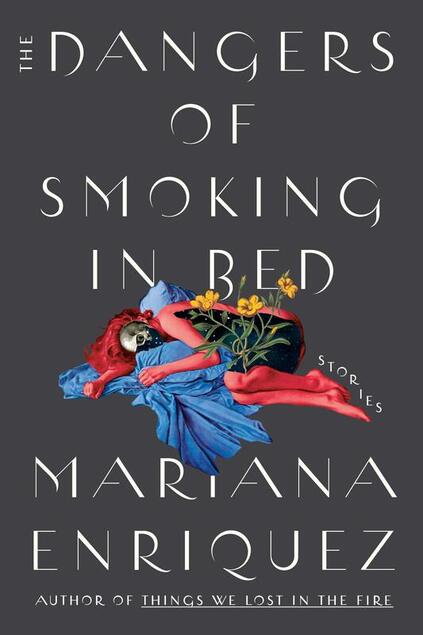The Dangers of Smoking in Bed
Mariana Enriquez
|
Envy, greed, lust, and gluttony. In Argentine writer Mariana Enriquez’s riveting collection of short stories, The Dangers of Smoking in Bed (translated by Megan McDowell), individuals are tempted by myriad cardinal sins. These macabre stories have some of the hallmarks of classic gothic stories similar to those of Edgar Allan Poe. There are beating hearts, unearthed reanimated bones, and exhumed bodies feasted upon by ravenous teens. The haunting stories set mainly in Argentinian locales detail female loss, pain, and violation. This is not a fictionalized detail in the grand scheme of things. In Argentina, young women’s disappearances and sexual violence run rampant. In “Angelita Unearthed,” a young girl digs up a collection of bones in her grandmother’s backyard. Years later, those same bones, reassembled as a baby girl shrouded in a pink blanket, reanimate themselves but the girl notes: “The angel baby doesn’t look like a ghost . . . she is half rotted away, and she doesn’t talk.” (6) Another gripping story explores the consequences of neighbors who shun the golden rule. An elderly homeless man clinging to the margins of society contains all his worldly possessions in “The Cart.” When the neighborhood expels the old man and seizes his cart, a host of unfortunate circumstances ensue: men lose their jobs, families lose their business, and freak accidents occur. No one is saved from newfound misery except the narrator and her family. This visceral story, where you can almost smell the malodorous scents wafting through the neighborhood, is a cautionary tale about charity and greed. |
“The Well” and “The Lookout” deal with women’s mental illness. In the former, the young protagonist Josefina, and her family members, take a yearly outing to Corrientes. One year, Josefina recalls visiting Irene, a bruja, who the family visits in the hopes of curing the susto, or fright, suffered by her mom, grandmother, and eight-year-old sister. While the family members recover from their anxiety, the bruja’s cure has irreparable consequences for Josefina. Similarly, in “The Lookout,” a young woman who suffers from PTSD returns to a beach hotel. A resident ghost referred to as “the lady upstairs” sets her sights on stealing away the young woman’s soul. Interestingly, while the female characters suffer from maladies like anxiety, nervousness, and PTSD, the stories tend to focus on those manifestations and less so on root causes.
“No Birthdays or Baptisms” unfolds the story of a young photographer who posts a Craigslist-type of ad for his services as a photographer seeking only bizarre behavior. The title of the story indicates his disdain for mundane celebrations. One assignment in particular plunges him into the depths of sinister family dysfunction. He is filled with lustful feelings for a young girl he photographs who is clearly the victim of sexual trauma. Wracked by guilt, the photographer eventually shuns his craft altogether.
In “Meat,” the author brings viscerality to a whole new level. Two fanatical teenagers become obsessed with a young Argentine rock star Santiago Espina. When the singer mysteriously commits suicide, the teens go to extraordinary lengths to associate themselves with him. The final scenes of the story occur at a cemetery as the caretaker of the graveyard finds the two girls “covered in dirt, blood and a film of muck that stank and was smeared all over their hands, face and clothes.”(104)
Propulsive dark themes of mental illness, suicide, PTSD, sexual violence, fanaticism, and childhood disappearances are unspooled in these stories. Simply put, they are stories of women (and girls) in crisis. In the hands of a skillful writer like Enriquez, the behavior and actions endured by the girls and women in the story appear mundane. However, that abuse, violence, and mistreatment suffered by the characters have consequences on mental health. While a reader may be able to turn away from these fictional horror stories, in real life, Latin American women continue to be victimized by the crimes of misogyny, sexism, and violence.
In the end, Enriquez does not disappoint—like the lingering muck coating the protagonists in “Meat,” these are stories that seep beneath your skin. Hallmarks of finely crafted horror.
Mariana Enriquez is a journalist and writer based in Buenos Aires, Argentina. The book has been shortlisted for an International Booker Prize with translator Megan McDowell. She is also the author of Things We Lost in the Fire (2016)
The Dangers of Smoking in Bed is a publication by Hogarth. Click here to purchase.
“No Birthdays or Baptisms” unfolds the story of a young photographer who posts a Craigslist-type of ad for his services as a photographer seeking only bizarre behavior. The title of the story indicates his disdain for mundane celebrations. One assignment in particular plunges him into the depths of sinister family dysfunction. He is filled with lustful feelings for a young girl he photographs who is clearly the victim of sexual trauma. Wracked by guilt, the photographer eventually shuns his craft altogether.
In “Meat,” the author brings viscerality to a whole new level. Two fanatical teenagers become obsessed with a young Argentine rock star Santiago Espina. When the singer mysteriously commits suicide, the teens go to extraordinary lengths to associate themselves with him. The final scenes of the story occur at a cemetery as the caretaker of the graveyard finds the two girls “covered in dirt, blood and a film of muck that stank and was smeared all over their hands, face and clothes.”(104)
Propulsive dark themes of mental illness, suicide, PTSD, sexual violence, fanaticism, and childhood disappearances are unspooled in these stories. Simply put, they are stories of women (and girls) in crisis. In the hands of a skillful writer like Enriquez, the behavior and actions endured by the girls and women in the story appear mundane. However, that abuse, violence, and mistreatment suffered by the characters have consequences on mental health. While a reader may be able to turn away from these fictional horror stories, in real life, Latin American women continue to be victimized by the crimes of misogyny, sexism, and violence.
In the end, Enriquez does not disappoint—like the lingering muck coating the protagonists in “Meat,” these are stories that seep beneath your skin. Hallmarks of finely crafted horror.
Mariana Enriquez is a journalist and writer based in Buenos Aires, Argentina. The book has been shortlisted for an International Booker Prize with translator Megan McDowell. She is also the author of Things We Lost in the Fire (2016)
The Dangers of Smoking in Bed is a publication by Hogarth. Click here to purchase.
|
Comment Box is loading comments...
|
|









